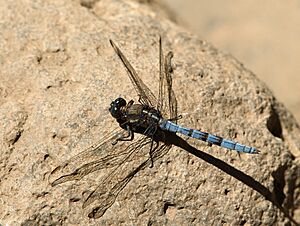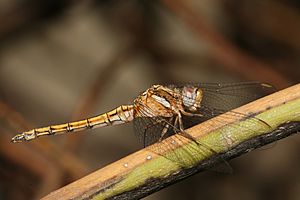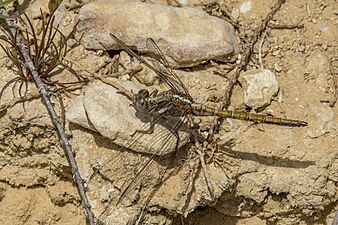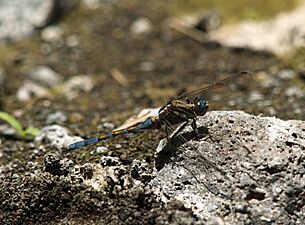Epaulet skimmer facts for kids
Quick facts for kids Epaulet skimmer |
|
|---|---|
 |
|
| Male | |
 |
|
| Female | |
| Conservation status | |
| Scientific classification |
|
| Kingdom: | Animalia |
| Phylum: | Arthropoda |
| Class: | Insecta |
| Order: | Odonata |
| Infraorder: | Anisoptera |
| Family: | Libellulidae |
| Genus: | Orthetrum |
| Species: |
O. chrysostigma
|
| Binomial name | |
| Orthetrum chrysostigma (Burmeister, 1839)
|
|
| Script error: The function "autoWithCaption" does not exist. | |
Script error: No such module "Check for conflicting parameters".
The epaulet skimmer (Orthetrum chrysostigma) is a type of dragonfly. Dragonflies are amazing insects known for their bright colors and speedy flight. This particular dragonfly belongs to a family called Libellulidae, which includes many common skimmer dragonflies.
You can find the epaulet skimmer in many parts of the world. It lives across a large area, mostly in Africa. Countries like Algeria, Egypt, Kenya, South Africa, and Nigeria are home to this dragonfly. It has also been seen in places like the Canary Islands, Israel, and Portugal. In 2010, it was even recorded in the Maltese Islands.
Contents
Where Epaulet Skimmers Live
Epaulet skimmers like to live in warm, wet places. Their natural habitats include different kinds of forests, especially those that are moist and low to the ground. They also enjoy savannas, which are grasslands with scattered trees.
Watery Homes
These dragonflies need water to survive. They often live near rivers, swamps, and wetlands. You might spot them around freshwater lakes and marshes. They also like areas with freshwater springs. Sometimes, these water sources might dry up for a bit, but the dragonflies can still manage.
What Epaulet Skimmers Look Like
Epaulet skimmers are quite colorful, especially the males.
Male Dragonflies
Adult male epaulet skimmers have bright blue bodies. This striking color helps them stand out.
Female and Young Dragonflies
Young dragonflies and females look a bit different. Their bodies are usually yellow and brown. This helps them blend in with their surroundings, which can be useful for avoiding predators.
What Epaulet Skimmers Eat
Like many dragonflies, epaulet skimmers are skilled hunters. They mostly eat other insects that fly. They catch their prey while flying, using their excellent eyesight and quick movements. This helps keep the insect population in balance.
Images for kids
 | Misty Copeland |
 | Raven Wilkinson |
 | Debra Austin |
 | Aesha Ash |




